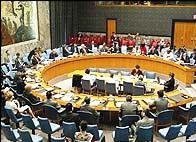 As if the vote count wasn’t humiliating enough, the government and the Maoists have been caught in a sickening blame game over Nepal’s failure to win a seat on the United Nations Security Council.
As if the vote count wasn’t humiliating enough, the government and the Maoists have been caught in a sickening blame game over Nepal’s failure to win a seat on the United Nations Security Council.Let’s face it: Nepal never had a real chance against a formidable competitor like Indonesia. If Ban Ki-moon’s hadn’t been elected secretary-general, leading South Korea to pull out of the race, Indonesia’s 158 votes in the General Assembly would have shrunk. Nepal’s 28 would have whittled down most conspicuously.
Diplomatic discretion disallowed any direct discouragement. Yet in the corridors of UN headquarters, there must have been a palpable expectation that Nepal would bow out and back Indonesia. But, no, Oli had to link Nepal’s candidacy to peace and democracy. If that were a viable strategy, it’s time ended circa 1995.
Now, Nepal’s dismal showing cannot be construed as a decisive repudiation of peace and democracy. Yet the world needed a rationale. You have a government that admits to parliament that the letter it sent to UN Secretary General Annan somehow got lost for several days. You have a Maoist organization that hollered the most in favor of UN involvement in the peace process, only to insist that Nepalis were capable of solving their problems once a UN mission did arrive in the country. The holier-than-thou attitude of Messrs. Oli and Mahara is outrageous.
When Nepal was elected to the Security Council for the first time in 1968, it had set the record for the highest number of ‘yes’ votes. Of course, UN membership has expanded massively since, but that doesn’t reduce the significance of the global affirmation in terms of proportion.
The second time Nepal succeeded in winning a seat on the most powerful organ of the world body in 1988, it promised to become a stepping stone to even greater accomplishment: the presidency of the General Assembly. But, no, the democratic government had to dismantle the foreign policy apparatus because it was created by the palace.
In 1968, Permanent Representative Padma Bahadur Khatri and his deputy, Devendraraj Upadhyaya, led a powerful campaign. Two decades later, Ambassador Jai Pratap Rana and his deputy, Mana Ranjan Josse, reaffirmed the extent of Nepal’s diplomatic dexterity provided the right people were doing the job.
Nepal’s third campaign began taking shape during the royal regime. King Gyanendra’s Foreign Minister Ramesh Nath Pandey was at least making a valiant effort. The Seven-Party Alliance (SPA) government probably expected its “historic mandate” to impress the world. With foreign ambassadors presenting their credentials at the palace even after the “historic proclamation,” Shital Niwas – one presumes that is what the Foreign Ministry is still informally called – should have known better.
The cacophony of a government that speaks with seven different voices, distorted by rebels who believe only their voice should prevail, can hardly claim coherence. Could Nepal form an opinion on international issues? If so, could the world expect Nepal to vote on a resolution with any credibility?
And our opponent? The world’s largest Muslim nation at a time the world is grappling with Afghanistan, Iraq, Israeli-Palestinian peace process and Iran’s nuclear program, among other things.
Had Nepal gracefully bowed out, it might have sorted out its internal dissonance for a more viable campaign two years later. Maybe – and just maybe – we could even have counted on a departing Indonesia.